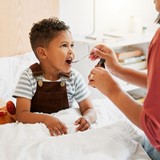Liquid medication is easy to swallow and is typically flavored to make its taste appealing to children. If your child doesn’t like the taste, it can be mixed with a small amount of food. It often comes with a small serving spoon or cup, but it can also be poured into a spoon at home. However you choose to administer it, be sure to measure the correct dosage.
Medication Safety
At Rexburg Pediatrics, the safety of our patients is extremely important to us. For this reason, we prioritize informing parents and guardians about medication safety so they can offer optimal care to their young ones.
You can ensure your child’s medication lasts longer and remains safe by following the guidelines below.
Store Medication Appropriately
To get the best results from any type of medication, storing it appropriately is crucial.
Appropriate storage can extend a medication’s shelf life, efficacy, and safety. Directions for storage are typically printed on the label or box. Some medications, like capsules or topicals, are often recommended to be stored in a cool, dry place. Certain medicines, like liquid bottles, may even require refrigeration. Avoid areas like the bathroom cabinet, where temperature fluctuations could affect medicinal quality.
It’s also important to store medications in a safe, out-of-reach place that children cannot access on their own.
Always follow specific instructions for storing medication, and ask your child’s healthcare provider for further information if instructions are unclear. When it comes to medication safety, there is no such thing as a silly question.
Never Use Medication Past the Point of Expiration
Medications do have expiration dates. When they expire, they can lose efficacy and sometimes may be more harmful to ingest than not. For this reason, it’s essential to make sure your child’s medication, especially stored medication, is up-to-date before you administer it to your child.
Pharmacists will always double-check to make sure the recommended course of a given medication will be within the parameters of expiry when offered to you. But you should always double-check and return out-of-date medication. Often, you will get a free refill if the prescription has just been given.
Read Instructions Carefully
All medications should come with a label, and it’s important to read it thoroughly. Medication labels generally include ingredients, dosage instructions, possible side effects, directions for refill requests, and a list of medications that may interact with the one prescribed.
Even if you purchase similar medications from two different brands (perhaps one is generic), it’s always essential to read the label. The ingredients, dosages, and side effects may differ, and making assumptions can have adverse consequences.
Child-Friendly Methods for Administering Medications
There are many methods of administering medications at home. Usually, medications prescribed in a pediatric setting are designed to ensure a child can take them easily and without a struggle. These modes of medication include:
Chewable tablets are another convenient method of medication intake for kids. Like liquid medication, chewables are usually flavored to improve their taste. Because these tablets can be chewed like food, they are easy for your child to ingest. Be sure your child chews thoroughly to ensure the medication’s absorption.
Topical medications can be applied through creams or ointments. They are painless and can be used to treat conditions like burns, scrapes, rashes, and more. Before and after administering the ointment, be sure to wash your hands.
An inhaler can be somewhat complex for children to operate, but a pediatrician will give you and your child an explicit demonstration of how to use it correctly. Keeping it stored in a safe environment and knowing the right asthma signs to justify its usage are necessary for proper administration.
Contact Rexburg Pediatrics
By implementing these guidelines, you can ensure your child’s medication remains safe.
Even responsible caregivers can easily forget to follow these protocols, especially if they are managing multiple medication schedules for different family members. Establishing an organized, out-of-reach station for the medications in your home is key to safe and effective administration.
If you have any questions about how to store or administer your child’s medication safely, do not hesitate to contact our experienced, friendly team at Rexburg Pediatrics. We’re happy to help!

